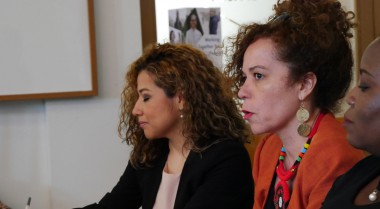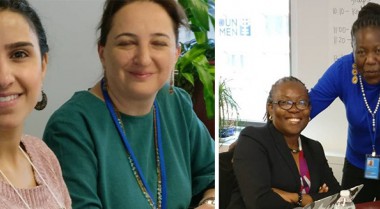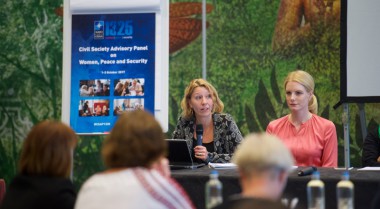Policy Memo: Fostering Inclusion Builds Resilient Societies
Despite numerous international commitments to the full implementation of the UN Security Council Resolution 1325 on Women, Peace and Security and subsequent resolutions which form the women, peace and security agenda, women and girls continue to be disproportionately affected by violent conflict, including atrocity crimes. In the context of conflict and war the violence women and girls face is much too often a result of direct targeting, such as in cases of sexual and gender-based violence. However, women are also bearing the worst of the subsequent economic and social costs. Women’s perspectives and experiences are often undervalued or ignored, limiting the ability of conflict-affected communities and other stakeholders to holistically, adequately, and collaboratively address and assess the needs of communities in the process of creating sustainable and inclusive peace.
In the context of conflict and war the violence women and girls face is much too often a result of direct targeting, such as in cases of sexual and gender-based violence.
To address some of the reoccurring issues as well as challenges that women and girls face in fragile, conflict and post-conflict situations, the Friedrich-Ebert-Stiftung New York Office (FES New York), the International Coalition for the Responsibility to Protect (ICRtoP), and Global Partnership for the Prevention of Armed Conflict (GPPAC), working in partnership through the Prevention Up Front (PuF) Alliance, convened a side event to the annual UN Security Council (UNSC) Open Debate on Women, Peace, and Security (WPS) in October 2018 highlighting the benefits of and best practices for integrating and including women peacebuilders into prevention work.
The panel brought together a diverse group of gender experts from Myanmar, Uganda, Ghana and Palestine who discussed ways to advance women’s roles in conflict and atrocity prevention. Reflecting on their personal experiences, the panelists developed a set of recommendations focused on how to support collaboration and cooperation across communities of practice and contribute to women’s meaningful participation in peace processes. They also as well as emphasised the need to establish stronger linkages between the Women, Peace and Security Agenda and Sustainable Development.
Drawing on the conclusions and recommendations of the panel FES New York, ICRtoP, and GPPAC are now launching the policy memo: Fostering Inclusion Builds Resilient Societies: Based on the experiences of women peacebuilders preventing conflicts and atrocities on the ground.
The Prevention Up Front Alliance is comprised of GPPAC and the World Federalist Movement-Institute for Global Policy (WFM-IGP), in partnership with the Netherlands’ Ministry of Foreign Affairs (MFA).


